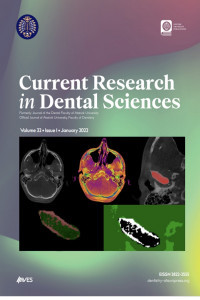ASSESSMENT OF KNOWLEDGE AND ATTITUDES TOWARD PERIODONTAL HEALTH AMONG PARENTS OF PEDODONTIC PATIENTS
___
- 1. Albandar JM, Rams TE. Global epidemiology of periodontal diseases: an overview. Periodontol 2000 2002;29:7–10.
- 2. Albandar JM, Tinoco EMB. Global epidemiology of periodontal diseases in children and young persons. Periodontol 2000 2002;29:153–76.
- 3. Jenkins WM, Papapanou PN. Epidemiology of periodontal disease in children and adolescents. Periodontol 2000 2001;26:16–32.
- 4. Chapple IL, Van der Weijden F, Doerfer C, Herrera D, Shapira L, Polak D, et al. Primary prevention of periodontitis: managing gingivitis. J Clin Periodontol 2015;42 Suppl 16:71-6.
- 5. Needleman I, Nibali L, Di Iorio A. Professional mechanical plaque removal for prevention of periodontal diseases in adults--systematic review update. J Clin Periodontol 2015;42 Suppl 16:12-35.
- 6. Kara MC, Zihni M. Erzurum bolgesindeki hastalarin agiz ve periodontal saglik konusundakì bìlgì düzeylerí. Atatürk Üniv Diş Hek Fak Derg 2004;14(3):1-8.
- 7. Beljan M, Puharić Z, Žulec M, Borić D, Neumuller KR. Parent’s and children’s behavior and knowledge about oral health. Acta Med Croatica 2016;70(3):165-71.
- 8. Walsh MM. Effects of school based dental health education on knowledge, attitudes and behavior of adolescents in San Francisco. Community Dent Oral Epidemiol 1985;13:143-7.
- 9. Murtomaa H, Meurman J, Rytomaa I, Turtola L. Periodontal status in university students. J Clin Periodontol 1987;14(8):462-5.
- 10. Murtomaa H, Ahlberg J, Mestsaniitty M. Periodontal awareness among adult Finns in 1972 and 1990. Acta Odontol Scand 1997;55:49-52.
- 11. Brady W. Periodontal disease awareness. J Am Dent Assoc 1984;109:706-10.
- 12. Taani DQ. Periodontal awareness and knowledge, and pattern of dental attendance among adults in Jordan. Int Dent J 2002;52(2):94-8.
- 13. Croxson LJ. Periodontal awareness: The key to periodontal health. Int Dent J 1993;43:167-77.
- 14. Lang WP, Ronis DL, Farghaly MM. Preventive behaviors as correlates of periodontal health status. J Public Health Dent 1995;55:10-7.
- 15. Nyandindi U, Palin-Palokas T, Milen A, Robison V, KombeN, Mwakasagude S. Participation, willingness and abilities of school teacher in oral health education in Tanzania. Community Dent Health 1994;11:101-4.
- 16. Vidya Sekhar, Sivsankar P, Easwaran M.A, Subitha L, Bharath N, Rajeswary K, et al. Knowledge, attitude and practice of school teachers towards oral health in pondicherry. J Clin Diagn Res 2014;8(8):12-5.
- 17. Khan N, Al-Shaafi M, Al-Garawi Z. Dental caries, fluorosis and knowledge of school teachers of Riyadh, Saudi Arabia. Pakistan Oral Dent J 2000;20:52-62.
- 18. Jiang H, Tai B, Du M. A survey on dental knowledge and behavior of mothers and teachers of school children. Hua Xi Kou Qiang Yi Xue Za Zhi 2002;20(3):219-20, 222.
- 19. Khanal K, Shrestha D, Ghimire N, Younjan R, Sanjel S. Assessment of Knowledge Regarding Oral Hygiene among Parents of Pre-School Children Attending Pediatric Out Patient Department in Dhulikhel Hospital. Kathmandu Univ Med J 2015;13(49):38-43.
- 20. Kumar S, Tadakamadla J, Zimmer-Gembeck M, Kroon J, Lalloo R, Johnson NW. The Effect of Parenting Practices on the Severity of Gingival Bleeding in Children. J Periodontol 2017;88(8):744-51.
- 21. Okada M, Kawamura M, Hayashi Y, Takase N, Kozai K. Simultaneous interrelationship between the oral health behavior and oral health status of mothers and their children. J Oral Sci 2008;50(4):447-52.
- 22. Okada M, Kawamura M, Kaihara Y, Matsuzaki Y, Kuwahara S, Ishidori H, et al. Influence of parents’ oral health behaviour on oral health status of their school children: an exploratory study employing a causal modelling technique. Int J Paediatr Dent 2002;12:101–8.
- 23. Pakpour AH, Hidarnia A, Hajizadeh E, Kumar S, Fridlund B. Why Iranian adolescents do not brush their teeth: a qualitative study. Int J Dent Hyg 2012;10:86–90.
- 24. Saied-Moallemi Z, Virtanen JI, Ghofranipour F, Murtomaa H. Influence of mothers’ oral health knowledge and attitudes on their children’s dental health. Eur Arch Paediatr Dent 2008;9:79–83.
- 25. Bandura A. Social cognitive theory of moral thought and action. In:Kurtines WM, Gewirtz JL, editors. Handbook of moral behavior and development. Hillsdale, New Jersey: Lawrence Erlbaum Associates Publishing, 1991, p.45–103.
- Başlangıç: 1986
- Yayıncı: Atatürk Üniversitesi
Burcu Kirşan BÜYÜKKOÇAK, Candan Semra PAKSOY
ANTERİOR BÖLGEDEKİ İMPLANT ÜSTÜ PROTEZLERDE YUMUŞAK DOKU ESTETİĞİ: 3 OLGU SUNUMU
Berkman ALBAYRAK, Nuran DİNÇKAL YANIKOĞLU
ASSESSMENT OF KNOWLEDGE AND ATTITUDES TOWARD PERIODONTAL HEALTH AMONG PARENTS OF PEDODONTIC PATIENTS
Meltem KARŞIYAKA HENDEK, Merve ERKMEN ALMAZ, Didem BEZIRCI, Ebru OLGUN
Ertuğrul KARATAŞ, Mustafa GÜNDOĞDU, Esra ULUKÖYLÜ, Rüştü Ersoy SAKARYA
EFFECT OF ULTRASONIC AND SONIC AGITATION ON THE PUSH-OUT BOND STRENGTH OF SELF-ADHESIVE RESIN CEMENT
Kübra YEŞİLDAL YETER, Esra KUL, Zeynep YEŞİL DUYMUŞ, Lütfü İhsan ALADAĞ
